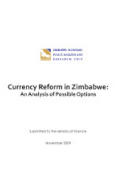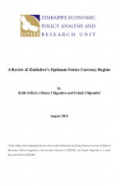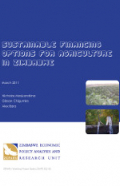This study looks at the feasibility and rationale of establishing a Debt Management Office (DMO) in Zimbabwe. This follows calls for the setting up of such an office by the Ministry of Finance as part of broad reforms to improve the conduct of debt management in the country.
Research Studies
The paper undertakes to assess and explore ways in which government can expand its fiscal space. The subsequent sections examine the four pillars of enhancing the space, adapting them to facts prevailing in Zimbabwe and explores the ways in which the government can create additional fiscal space will.
Following a period of economic stability under the inclusive government, attention has now shifted to having more investment in growth-enhancing infrastructure in sectors such as power, transport and water sectors. On appreciating its limitations in handling the task, the Government took a stance to adopt public private sector partnerships (PPP), under which the private sector would be called in to partner Government.
Prior to the official adoption of the multi-currency system in January 2009, the economy was characterized by hyperinflation, high & unsustainable budget deficit; a growing balance of payments deficit; dwindling foreign currency reserves, acute foreign exchange shortages, low capacity utilisation; financial disintermediation and shortages of the local currency (Zimbabwe dollars Z$ cash).
The purpose of this paper is to revisit the issue of Zimbabwe’s optimum future currency regime choice in the light of experience in the Zimbabwe economy and developments in Southern African Development Community (SADC) with regard to regional integration, as well as general global experiences with regard to currency regimes.
This paper seek to investigate the extent to which Zimbabwe’s agriculture sector, has a financing gap and to find ways and strategies that can be adopted by Government, banks and the donor community to close the gap. The paper notes that there indeed exists a financing gap in the country’s agriculture sector, especially after the Fast Track Land Reform Programme due to land ownership challenges that emerged in the country’s land market.








